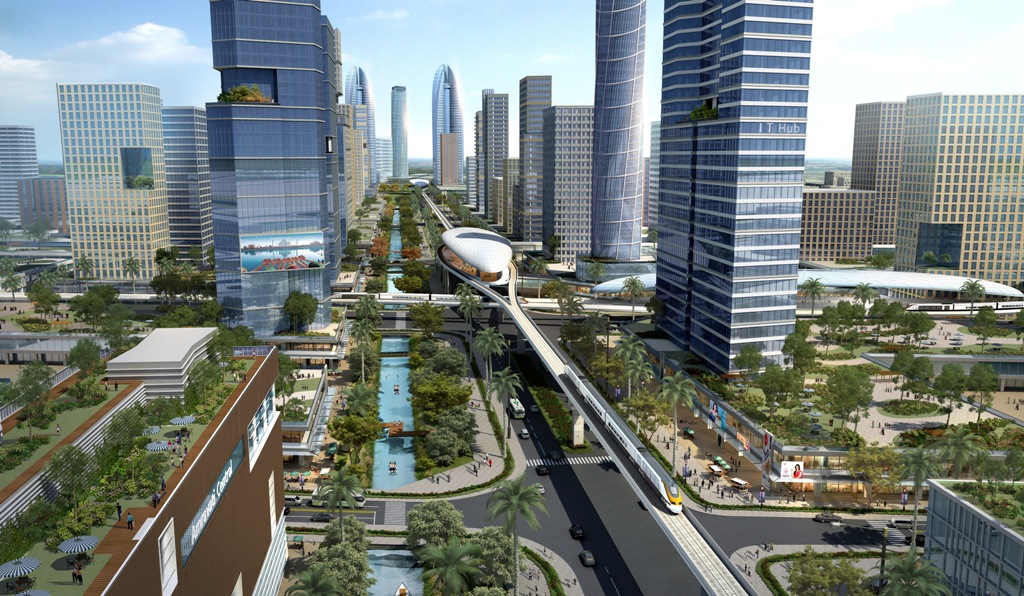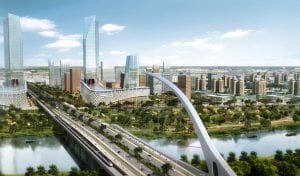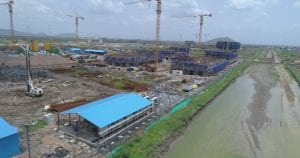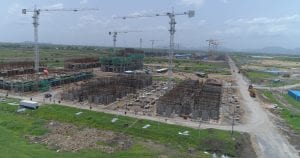
The fate of AP's ₹55,000 cr dream project, Amaravati, hangs in balance

Amaravati literally means the ‘Land of Immortals’. But, what it is witnessing now is the existential crisis of mere mortals.
Touted as the world-class capital city that India has never seen before, Amaravati, a dream project of the former Chief Minister N Chandrababu Naidu, is now staring at an uncertain future following a change of guard in the state.
With the new government, headed by YS Jagan Mohan Reddy, ordering a review of all major projects of the previous regime, a question mark hangs over the capital project which is already bogged down by resource crunch, shoddy implementation, blame-game between the state and the Centre and allegations of cronyism and environmental degradation.
Ominous signals
On July 1, the residents of Vijayawada woke up to a surprise announcement that further fuelled fears over the fate of their dream capital project.

The official announcement was about the termination of flight services to Singapore, the only international air travel service from the coastal Andhra city. It came at a time when the works related to Amaravati, the ultra-modern capital city being planned in the Vijayawada-Guntur region, have been put on a pause mode.
The bi-weekly non-stop flight was a small first step taken by the previous TDP government to put the city on the international air travel map and enhance its brand image to attract investments. The cancellation of air operations followed the decision of the new government not to renew the Viability Gap Funding (VGF) agreement with Indigo Airlines which has been operating the service since December last year.
The development is expected to have implications for Amaravati project. While talking to The Federal, Kesineni Srinivas, TDP MP from Vijayawada, said, “It is clear that the new government wants to destroy brand Amaravati and put the clock backward.” The opposition MP’s apprehensions are shared by many in the region, a fertile coastal belt that is now giving way to a glitzy riverfront capital spread over 217 sq.km.
Air of uncertainty
A question mark hangs over the fate of the ₹55,000 crore project following the change of government. The Chief Minister YS Jagan Mohan Reddy, who steered his YSR Congress Party to a landslide victory in the April 11 elections, has been a staunch critic of his predecessor Naidu’s pet project, particularly the land pooling process and the selection of bidders for implementation of various components.
During the first press conference after taking over as Chief Minister, Jagan said, “The whole project reeks of a scam. It is similar to insider trading. Naidu and his close associates had purchased vast tracts of land at throwaway prices before announcing the location of the new capital. It has been turned into unscrupulous real estate deals.”
While he has not spelled out any specific plan so far, beyond vowing to “unearth all corrupt deals” of the previous TDP regime, a cloud of uncertainty hangs over Amaravati.
An unofficial instruction has gone out to the authorities to halt all the works related to the capital city until it is “reviewed at the highest level.”
The doubts over the fate of Amaravati revolve around five key areas:
- Will the new government opt for changing the location of the capital city closer to Rayalaseema region from where Jagan hails?
- Will it offer the farmers an option of taking back their lands given under the land pooling scheme. Over 34,000 acres of land, spread over 29 villages in Guntur district, was acquired for the project.
- Will it terminate the agreement with a Singapore consortium which has already started works to develop the core start-up area over 6.84 sq.km in the capital city? It is being taken up under the Public-Private Partnership model.
- Will Jagan opt for a “cluster” model of developing a string of towns across coastal and Rayalaseema regions instead of a singular focus on Amaravati.
- The impact of the delays and uncertainty over the potential investors.
However, there are no clear answers as yet.
Officials clueless
While talking to The Federal, Dr P Lakshmi Narasimham, Commissioner of AP Capital Regional Development Authority (APCRDA), said, “All the works have virtually come to a halt now. We expect clarity from the government by this month end.” The APCRDA is the nodal agency to oversee the implementation of the project.
For a state that is reeling under bifurcation blues following the loss of Hyderabad to Telangana, the scale and grandeur of the capital city offers new hope. However, the project is entirely dependent on institutional funding, both domestic and external, since the state coffers are virtually empty.
“We need huge resources to make this dream a reality. Till now, we have spent ₹8,000 to ₹10,000 crore. This includes ₹1,500 crore released from the Centre,” the Commissioner said. A Detailed Project Report (DPR) submitted to the Centre, seeking ₹1,100 crore, has been ‘hanging fire’, he added.
The state government’s failure to release the annuity amounts to the farmers as part of the land pooling agreement has further deepened fears over the future of the capital project. The annuity amounts were due to be paid by June 1.
The government had pooled 34,075 acres from 28,148 land owners, spread over 29 villages. Under the scheme, the government pays ₹25,000 per acre per year for 10 years to each farmer who parted with his or her land. There would be a five per cent increase every year on the promised payment. The government also promised to give back developed plots of 1,000 square yard per acre to farmers within nine months from the date of the completion of the land pooling. The expectation was that the farmers would be immensely benefitted since the value of these lands is bound to increase in the future.
Galore of hurdles
The project has hit a roadblock with the expected funds not flowing in. The political bitterness between the BJP and the TDP, following the latter’s exit from the NDA last year over denial of Special Category Status (SCS), had worsened the situation.

The previous government had approached the World Bank, which offers cheaper loans at 5% to 6% interest, for ₹7,000 crore loan for infrastructure development but the NDA government pruned it to ₹3,800 crore and provided the counter-guarantee. Though the Bank initially offered to provide the loan, it backed out later following objections from a group of farmers from the capital region who accused the government of acquiring lands by coercion.
The government also approached JICA (Japanese International Cooperation Agency) and ADB (Asian Development Bank) for financial assistance but its efforts are yet to make much headway.
However, HUDCO has sanctioned ₹1,200 crore loan, enabling the government to kick off infrastructure works. On its part, the APCRDA has raised ₹2,000 crore through bonds to meet the capital cost in August, 2018.
With the World Bank assistance failing to become a reality, there is a delay in developing the plots, with roads, drains and other infra facilities, to be handed over to the farmers who gave their lands for a capital city project.
Unfinished works, uncertain future
Massive heavy-duty cranes lying idle at the sites, half-finished official complexes and unfinished roads greet the visitors driving from Vijayawada towards the core capital region.
According to Kommineni Poornaiah, a farmer at Uddandarayunipalem village, about 30 kms from Vijayawada, said, “As you can see, all construction activity has come to a grinding halt. We get to hear all kinds of stories about the future of Amaravati. The youth in our villages are sitting idle because they have no work.” It is here that Prime Minister Narendra Modi had laid the foundation stone for the capital city in October, 2015, he recalled.
Poornaiah, who gave one acre of his land for land pooling, is worried that the future for people like him would be bleak if the government doesn’t put an end to the uncertainty.

Further down, at Rayapudi village, an eerie silence prevails at a site where a massive government complex is to come up. The construction activity has come to a standstill here too. The multi-storeyed residential complexes for IAS, IPS and other officials, MLAs and MLCs are half-finished. So is the high court complex nearby.
“More than 75 percent of the workers have been sent home. We don’t know what lies ahead,” lamented Benjamin Valapula, a farmer who had given 80 cents for land pooling. None of the farmers in the region was enthusiastic about the idea of taking back their lands if such an option was offered to them by the new government.
“How is it even possible? Roads have come upon our lands. And, plots have been allotted to other farmers in our lands. Similarly, we have got plots in others’ lands,” said B Srinivasa Rao, pointing towards the road widening works near his village, Rayapudi.
A real estate consultant G Srinivasa Rao in Tulluru town questioned the rationale behind the government’s decision to constitute a cabinet sub-committee to review all the major projects undertaken by the previous regime.
“All farmers had voluntarily given their land for the capital city in the hope that the region will see a massive development and bring in new opportunities for their children. We need capital that can compete with Hyderabad and other cities. If there were any irregularities in land pooling, the government should punish the guilty but should not stall the whole project,” he said.
The buying and selling of plots in the region have come to a standstill now because of the uncertainty surrounding the construction works.

